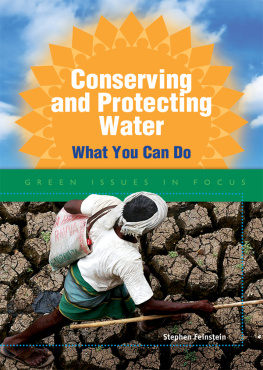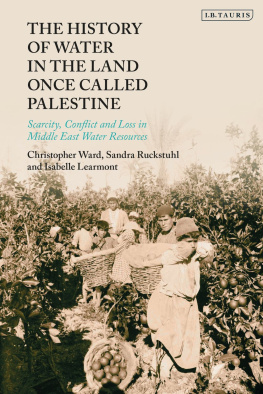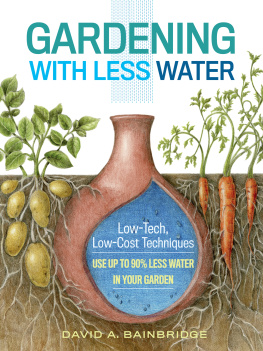
Praise for this book
This book provides a compelling argument for the water sector to look at MUS much more strategically, and for the growing number of local and community-driven development programmes to realize their potential in providing for the multiple basic needs around water services that poor communities grapple with across the developing world.
Janmejay Singh, former Coordinator of the Community-Driven Development (CDD) Community of Practice, World Bank
This book integrates what until now have remained separate, namely the drinking water and irrigation sub-sectors, despite more than two decades of efforts at alignment. The book provides a practical guide on how to overcome this artificial divide, and how investing in local water service provision can make a real difference for people, not only in terms of their health but also their wealth. This well-written book is not only a must-read for water engineers, local government planners, agricultural extension workers and public health officers, but also, and essentially, for politicians!
Pieter van der Zaag, Professor of Water Resources Management, UNESCO-IHE Institute for Water Education, The Netherlands
At last a book that tells us why MUS can both break down problematic silos in the water sector and provide multiple benefits to enhance human well-being. It also provides us with powerful lessons regarding scaling up and public sector accountability. This book is a must-read for anybody concerned with pro-poor and gender equitable water services and for solutions that emerge from the grounded experiences of local water users around the world.
Lyla Mehta, Research Fellow, Institute of Development Studies, University of Sussex, UK

Practical Action Publishing Ltd
The Schumacher Centre
Bourton on Dunsmore, Rugby,
Warwickshire CV23 9QZ, UK
www.practicalactionpublishing.org
Copyright International Water Management Institute, 2014
ISBN 978-1-85339-829-2 Hardback
ISBN 978-1-85339-830-8 Paperback
ISBN 978-1-78044-829-9 Library Ebook
ISBN 978-1-78044-830-5 Ebook
All rights reserved. No part of this publication may be reprinted or reproduced or utilized in any form or by any electronic, mechanical, or other means, now known or hereafter invented, including photocopying and recording, or in any information storage or retrieval system, without the written permission of the publishers.
A catalogue record for this book is available from the British Library.
The authors have asserted their rights under the Copyright Designs and Patents Act 1988 to be identified as authors of this work.
van Koppen, B., Smits, S., Rumbaitis del Rio, C. and Thomas, J.B. (2014) Scaling up Multiple Use Water Services: Accountability in the Water Sector, Rugby, UK: Practical Action Publishing
< http://dx.doi.org/10.3362/9781780448299.000 >.
Since 1974, Practical Action Publishing has published and disseminated books and information in support of international development work throughout the world. Practical Action Publishing is a trading name of Practical Action Publishing Ltd (Company Reg. No. 1159018), the wholly owned publishing company of Practical Action. Practical Action Publishing trades only in support of its parent charity objectives and any profits are covenanted back to Practical Action (Charity Reg. No. 247257, Group VAT Registration No. 880 9924 76).
Cover design by Mercer Design
Typeset by Marie Doherty
Contents
About the authors
Dr Barbara van Koppen is Principal Researcher in Poverty, Gender and Water at the International Water Management Institute. She has 30 years of experience in action research and implementation of water services for multiple uses to poor women and men, and pro-poor water law in Africa, Asia and Latin America. She has written more than 80 international publications and is the co-ordinator of the MUS Group.
Stef Smits is Senior Programme Officer and Co-ordinator of the Latin America Regional Programme for IRC International Water and Sanitation Centre, based in The Hague. He has more than 10 years of experience in rural water supply, particularly in Latin America and Southern Africa. He has (co)authored various books and journal articles on rural water supplies, including on multiple use of water in such supplies, and is the secretary of the MUS Group.
Cristina Rumbaitis del Rio joined The Rockefeller Foundation in 2007. As a Senior Associate Director, Dr Rumbaitis del Rio has worked on initiatives related to climate change resilience in urban development, climate smart agriculture, water services delivery, and marine conservation and fishing. After receiving a doctoral degree in ecology from the University of Colorado, she became a post-doctoral fellow conducting research on sustainable development at Columbia Universitys Earth Institute. She has worked in Sri Lanka, Kenya, Ethiopia, India, Thailand and other countries.
John B. Thomas has been Program Associate at The Rockefeller Foundation since 2011. His work is focused on revaluing ecosystems, fisheries and aquaculture, water, and agricultural development. Before this, he worked on a project to develop innovative sanitation solutions that met the needs of Cambodias rural poor through a partnership with the Hasso Plattner Institute of Design and International Development Enterprises Cambodia (iDE). He has also worked in Kenya, Uganda and Namibia.
Preface
This book explores the links between global reform in public services towards accountability through local and community-driven development (LCDD) and trends towards more accountability in water services in rural and peri-urban areas in developing countries. The books proposition is that the new approach of multiple use water services (MUS) is the pivot between the two. MUS is a public services approach that takes poor peoples multiple water needs as the starting point for planning and providing water services. Since its emergence in the early 2000s, MUS has been tried out in 22 countries. Pilot projects and scaling up have taken place especially in a) the WASH sub-sector (as domestic-plus), b) the irrigation sub-sector (as irrigation-plus), c) the water sector without a pre-defined priority use (as MUS-by-design), and d) implicitly in the new generation of multi-sectoral local and community-driven development (LCDD) programmes wherever communities prioritize improvements in water development and management (as implicit MUS).
This book uses the accountability triangle between citizens, policymakers and service providers and related concepts derived from global public services reform to analyse past pilot projects and scaling up of these four MUS modalities, and to recommend future steps. Evidence is mainly derived from MUS Scoping Studies in Ethiopia, Ghana, India, Nepal, and Tanzania; an MUS Roundtable supported by The Rockefeller Foundation, and from insights generated by over 200 case studies collected in the repository of the MUS Group. On this basis, the book develops three messages, one about the why and two about the how of scaling up MUS.
First the why. MUS has five strengths because of the nature of water but they have been hidden in past service delivery because of the compartmentalization of the water sector into many sub-sectors. These strengths have been proven to lead to higher human development performance (or plausibly do). First, MUS leverages and supports water self-supply; self-supply is peoples investment in water infrastructure creating the human, physical, technical, financial and institutional capital of local water development and management. Second, MUS follows peoples priorities, so that services are owned and locally appropriate. Third, MUS generates multiple water uses and so multiple health and wealth benefits in peoples multifaceted livelihoods. Fourth, MUS develops multipurpose infrastructure, which is more cost-effective as a rule; single-use infrastructure is the exception. Lastly, MUS efficiently considers the local water cycle and the use and re-use of its multiple sources.







![David E Newton] - The global water crisis : a reference handbook](/uploads/posts/book/104432/thumbs/david-e-newton-the-global-water-crisis-a.jpg)



